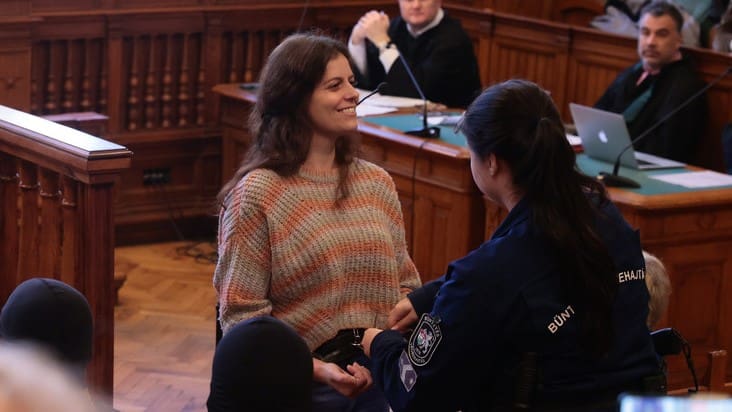You would think that people accused of serious crimes would appear in court with a sombre expression, especially after being held in allegedly abominable circumstances in the dungeons of an autocracy like Hungary. Not Ilaria Salis, the 39-year-old Italian accused of
the attempted crime of life-threatening bodily harm committed in a criminal organization,
in two cases as an accomplice and in one case as an accessory to a crime. She entered the courtroom smiling, and according to the photos published in press reports, the smile lingered on her face throughout the court hearing.
Salis is one of the 20 radical left-wing, apparently anti-fascist activists, who arrived in Budapest last February with the explicit purpose of attacking ‘neo-Nazis’ and/or ‘neo-Nazi sympathizers’ ahead of the so-called Day of Honour events organized by Hungarian extreme-right groups. The events commemorate the attempt by the German and Hungarian forces in February 1945 to break through the lines of the Soviet Red Army that had encircled the Hungarian capital during what is known as the Siege of Budapest. 17 of the perpetrators have been identified by the Hungarian authorities, and three went on trial earlier this month after being held in custody for over a year.
What makes the acts of the mostly German Antifa criminals even more sickening than it would otherwise be is that
their victims were randomly chosen, based only on the way they looked.
The cowardly thugs hiding behind masks and hoodies or caps, as their comrades everywhere around the world do, had apparently planned the choreography of the attacks almost scientifically, to achieve the greatest ‘impact’ and at the same time reduce the chance of being identified and apprehended. They mostly assaulted their victims—who, on the basis of their clothing (!), ‘looked extreme right-wing’—from behind, using steel batons, rubber hammers and gas sprays, wearing gloves lined with lead, and on one occasion, an unidentified sharp object to inflict stab wounds.
Of the three foreigners currently on trial—two Germans, a male and a female, and the Italian Ilaria Salis—the man, Tobias Edelhoff has pled guilty, and was sentenced to three years in prison, with both the defence and the prosecutor appealing the verdict, so the ruling is not binding. The German woman called Christina Mehwald and Salis have pled not guilty.
Our readers should make no mistake: the perpetrators of the unprovoked, vile attacks meant to cause grave harm, and they did.
One of the victims had his shin bones fractured to tiny pieces; another had his skull split open; a woman suffered several stab wounds.
Three of the people assaulted were Polish citizens, who suffered, among other things, rib fractures. As Hungarian Conservative also reported, one attack was caught on video thanks to a public surveillance camera.
And what is the reaction of the Italian political left, aided and abetted by the mainstream left-liberal press? It is attempting to frame the whole story as being about the victimhood of an innocent ‘primary school teacher’, the said Salis, who is charged with crimes very close to what could be defined as terrorism! This distorted narrative was fabricated after photos of the Italian defendant wearing handcuffs and shackles in the courtroom were published, along with the testimony of her father to whom Salis had told in a letter that she was being held in abominable conditions.
First of all: people charged of violent crimes, regardless of their gender, nationality, ethnicity or level of education, are handcuffed and shackled in Hungary as a rule when taken to a court hearing. It is totally beside the point that Salis happens to be a woman, a foreigner and ‘a teacher’—in fact, listing her profession with the aim of generating sympathy achieves the opposite effect in every sane person. It is a disgrace that such an individual, suspected of crimes that suggest that she suffers from a kind of moral insanity, is allowed to teach small children. But of course, according to the leftist discourse, the Salis ‘case’ is just another symptom of the alleged lack of independence of the judiciary. in Orbán’s Hungary.
Secondly: prison conditions in Hungary indeed often leave a lot to be desired. This is no secret, and improving the situation is work in progress, a complex issue that we have also written about.
What also needs to be highlighted is the tendentious language used by the Hungaro- and Orbánophobic media reporting on the Salis story. According to the Hungarian correspondent of the BBC, Salis is accused of violent assaults ‘against neo-Nazi sympathisers’. Well, there is no evidence whatsoever about the victims being ‘neo-Nazi sympathizers’. But even if they are: is that supposed to be an excuse for what was done to them?
As opposed to the victims being labelled without hesitation as neo-Nazis, there is no reference to Salis as Antifa or violent leftist in the left-liberal press reports (as far as the right-leaning outlets are concerned, she is in fact referred to as an ‘anti-fascist activist’). She is merely described as an ‘educator’ or ‘primary school teacher’. As opposed to that, the Italian vox populi is impeccable: practically all commentators below the various reports opine that she should not have gone to a foreign country to make trouble, and if she chose to do so, she must bear the consequences.
Some Italian left-wing politicians have not hesitated to call Hungary a country ‘resembling South American dictatorships’
and some have even called on Giorgia Meloni to make a phone call to ‘her friend’ Viktor Orbán, ‘the autocrat’, and demand the immediate release of the teacher. The lawyers of the woman have already announced that they are turning to the European Court of Human Rights over her alleged mistreatment.
Following the mounting domestic pressure from the left, Italian Foreign Minister Antonio Tajani summoned the Hungarian ambassador in Rome today ‘to ask why some of the most fundamental norms on conditions of detainees were not respected’. Apparently, according to Italian press reports, the Italian premier had a phone call with Viktor Orbán about the Salis case on 30 January.
Well, all diplomatic communication aside, we have a sound piece of advice to anyone planning to go to a foreign country with the obvious aim of physically attacking citizens of that country for whatever reason: don’t do it. Especially not if that country happens to be Hungary.








